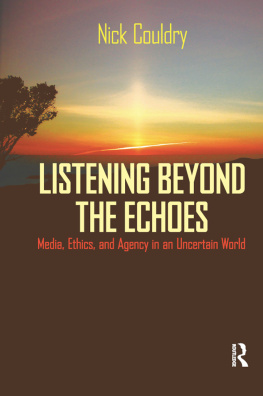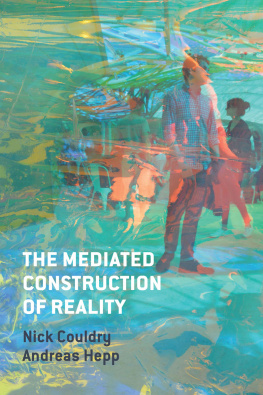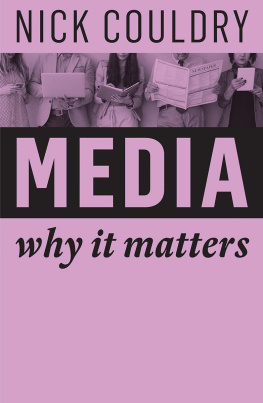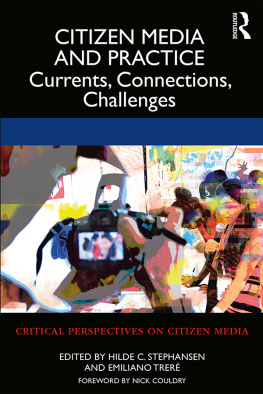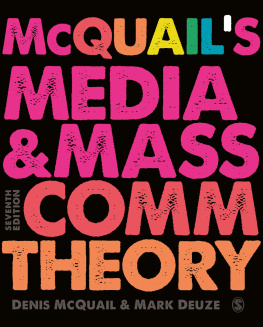LISTENING BEYOND THE ECHOES
Cultural Politics & the Promise of Democracy
A Series from Paradigm Publishers
Edited by Henry A. Giroux
Empire and Inequality: America and the World Since 9/11
by Paul Street (2004)
The Terror of Neoliberalism
by Henry A. Giroux (2004)
Caught in the Crossfire: Kids, Politics, and Americas Future
by Lawrence Grossberg (2005)
Reading and Writing for Civic Literacy: The Critical Citizens Guide to Argumentative Rhetoric
by Donald Lazere (2005)
Why Are We Reading Ovids Handbook on Rape? Teaching and Learning at a Womens College
by Madeleine Kahn (2005)
Schooling and the Struggle for Public Life, Updated Edition
by Henry A. Giroux (2005)
Listening Beyond the Echoes: Media, Ethics, and Agency in an Uncertain World
by Nick Couldry (2006)
Michel Foucault: Materialism and Education, Updated Edition
by Mark Olssen (2006)
Pedagogies of the Global: Knowledge in the Human Interest
edited by Arif Dirlik (2006)
Patriotic Correctness: Academic Freedom and Its Enemies
by John K. Wilson (2006)
LISTENING BEYOND THE ECHOES
Media, Ethics, and Agency in an Uncertain World
NICK COULDRY
First published 2006 by Paradigm Publishers
Published 2016 by Routledge
2 Park Square, Milton Park, Abingdon, Oxon OX14 4RN
711 Third Avenue, New York, NY 10017, USA
Routledge is an imprint of the Taylor & Francis Group, an informa business
Copyright 2006, Taylor & Francis.
All rights reserved. No part of this book may be reprinted or reproduced or utilised in any form or by any electronic, mechanical, or other means, now known or hereafter invented, including photocopying and recording, or in any information storage or retrieval system, without permission in writing from the publishers.
Notice:
Product or corporate names may be trademarks or registered trademarks, and are used only for identification and explanation without intent to infringe.
Library of Congress Cataloging-in-Publication Data
Couldry, Nick.
Listening beyond the echoes : media, ethics, and agency in an uncertain world / Nick Couldry.
p. cm. (Cultural politics and the promise of democracy)
Includes bibliographical references and index.
ISBN13: 9781594512353 (hc 13)
ISBN10: 1594512353 (hc 10)
1. Mass media and culture. 2. Mass mediaMoral and ethical aspects. I. Title. II. Cultural politics & the promise of democracy.
P94.6.C687 2006
302.23dc22
2006001593
ISBN 13 : 978-1-59451-235-3 (hbk)
ISBN 13 : 978-1-59451-236-0 (pbk)
Designed and Typeset by Straight Creek Bookmakers.
To my friends in Our Media/Nuestros Medios
This book brings together some reflections on the state of media and cultural research at a time of multiple uncertaintieseven crisesin democratic engagement, social belonging, the role of universities, the role of media research in the academy, the direction of critical research, and the focus of the Left.
Most of the book reflects on what in the field of media and cultural research we should be doing in the face of these uncertainties, rather than providing direct analysis of contemporary media. Those who want immediate answers will not therefore be satisfied: my response to their likely complaint is that, with such uncertainties to confront, some reorientation may be necessary, and reorientation means standing still, for a moment, and listening out for new possibilities.
The questions raised by critical media research and cultural analysis are complex; even this books partial perspective is required to move from media and cultural studies to the social sciences more generally (). One chapterthe lastdoes move beyond reorientation to substantive analysis, but on the new and difficult terrain of media ethics where I have tried to be realistic about how far one author can travel; ethics, is, I believe, vital and neglected in media research, but, to succeed, it requires a collective effort over a long period, to which I hope this book proves a contribution.
Although the context is challenging, the book follows an intuition that the necessary reorientation involves foregrounding quite simple questions: What practices of daily life are media involved in? How do media contribute to the culture of democratic politics? How can we live, ethically, with and through media?
Even so, the books emphasis on second-order questions may still strike some as strange. In global circumstances of considerable conflict and danger, shouldnt all our energies be devoted, for example, to deconstructing the ideological discourse of the current U.S. and UK administrations or the growing corporate monopolization of media industries? Of course, thats important, but there are other ways of responding to the dangers of our time. If we suspect that mediathat is, highly centralized institutional processes of mediationare integral, not incidental, to the current crisis of Western democracy, and if we suspect also that one path beyond that crisis lies in listening very carefully to how citizens are experiencing the consequences of that crisis for their own sense of agency, then direct research into media texts and institutions needs to be supplemented by other (as I will call them) decentered strategies for understanding mediated societies. And the most important response of all to the current crises may be to try and develop, in terms that escape the pull of media discourse, a framework for assessing whether medias contribution to our collective and individual lives is as we want and need it to be.
Earlier versions of contains material previously published as Beyond the televised endgame? Addressing the long-term consequences of global media inequality, in N. Chitty, R. Rush, and M. Semati (eds.), Studies in Terrorism: Media Scholarship and the Enigma of Terror, Penang: Southbound Press, 2003: thanks to Southbound Press for permission to republish this material.
I owe a great debt to Henry Giroux for suggesting the possibility of this book and for comments on the whole manuscript that saved me from a number of confusions; and an equally great debt to Dean Birkenkamp for being an extremely supportive and responsive publisher. Thanks to James Curran and Roger Silverstone for helpful comments on a much earlier draft of . Needless to say, responsibility for the remaining errors is mine.
Thanks also to my colleagues in the Department of Media and Communications at the London School of Economics for providing a very stimulating environment over the last four years in which to get this work done.
Heartfelt thanks to my wife, Louise Edwards, for her patience, support, and love, without which this book could not have been written.
I dedicate this book to my friends in the Our Media/Nuestros Medios network, whose work contests on a daily basis many of the injustices that, more indirectly, I address here. I could not wish for more inspiring collaborators in the wider world of media and cultural research than they.
That is why I take as the start of the book a quotation from a work of community-based media, the Enciclopedia Cultural de Chilo, published in many volumes by the Fundacion Radio Estrella del Mar, from the Chilo region of Chile (for background, see Rodriguez, 2003). The quotation is from its preface, written by Bishop Ysern, one of the works main inspirations and facilitators. Thanks to Angelica Rosas and Soledad Lorca from Radio Estrella del Mar who attended the Our Media/Nuestros Medios III conference in Barranquilla, Colombia, in May 2003 and generously gave me a copy of this remarkable work.

